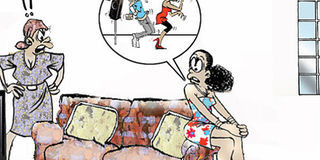Parenting your ‘cool’ children to be reliable adults

You’ve seen them. Those 13-year-old girls who wear loads of garish makeup, go to parties with way older children, and have real boyfriends. ILLUSTRATION| IGAH
What you need to know:
Their relationships are generally more emotionally intense and sexualised, and they often skip school, get involved in petty crime and so on. And all this “in-your-face” behaviour does earn them massive popularity - for a while.
But a few years later, as their peers gradually catch up with them, it all fades away.
You’ve seen them. Those 13-year-old girls who wear loads of garish makeup, go to parties with way older children, and have real boyfriends. Those 13-year-old boys who drink beer and carry condoms.
Their classmates think they’re enormously cool, and are totally in awe of them.
But what happens to those socially precocious kids as they grow up?
They rarely turn out well. Their social status generally nosedives in their late teens, and by their early 20s many of them are having problems with alcohol, drugs, relationships - and the police.
Their behaviour often becomes more and more extreme as they try to maintain their cool reputation. But actually their peers see right through them. And realise that they’re not actually what they seem any more.
Actually their early teen behaviour wasn’t real either. It was all about impressing their classmates. Which is why the cool kids only hang out with people who are physically attractive.
Their relationships are generally more emotionally intense and sexualised, and they often skip school, get involved in petty crime and so on. And all this “in-your-face” behaviour does earn them massive popularity - for a while. But a few years later, as their
peers gradually catch up with them, it all fades away.
LEFT BEHIND
Why’s that? It’s because acting ahead of your age early on actually ends up leaving you behind. For example, chasing popularity and depending on your social status to get friends means that you never figure out how relationships really work.
While your peers are learning good friendship skills through simple everyday activities like sports, hobbies, and watching TV or movies together.
So if you’re the parent of a precocious young teen, help them to understand that “popularity” has its downsides. Encourage them to get involved in sports and so on, especially with same sex classmates, and to be good and loyal friends: supportive, kind and
considerate.
You’ll have an uphill struggle, of course, because they’ll see things very differently. And will still be way too impressed by the cool kids.
But while those cool kids will hugely influence your childrens’ ideas about clothes, music and so on, they’re actually very poor role models. After all, think who the cool kid’s own role models are: older kids who were once cool themselves, and who’re only
willing to hang out with younger teens because their own lives are coming apart…
Fortunately, for most children, getting hung up on “cool,” pseudo-mature behaviour doesn’t have to lead to disaster. Even the most precocious young teens can still become responsible adults, get a degree and find a good job. As long as their parents
consistently teach them the right values.
So help your children to appreciate individuality, hard work and perseverance, and to have the confidence that comes from genuine ability. And to their surprise, they’ll also find that they’re genuinely admired by their classmates, even without copying what all
the others are doing.





